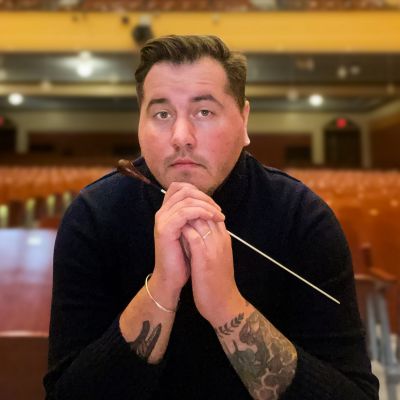
Zane Kaiser
Justice Page Middle School, Minneapolis Public Schools
Minneapolis, Minnesota
When Zane Kaiser started as the Band and Orchestra Teacher at Justice Page Middle School in Minneapolis, the music program had no budget allocated to it. In the seven years since, Kaiser has built the program and budget slowly and methodically. “Our school community is deeply passionate about music education,” he explains. “Through the continued support from parents and community leaders, I have been able to provide instruments and supplies to any student who wants to be in band and orchestra. I often find ways to share instruments, rehearsal spaces and resources to keep everyone afloat. Grants and donations really make a difference each and every day.”
His efforts have worked — the program has increased from 250 to 450 students. To attract new students and keep current ones in the program, Kaiser says “rehearsals must dance an engaging line between high expectations around musicianship and good old fun. I strive to get students to laugh at least once during class, which pushes them to be more willing to try new and often difficult musical things.”
Kaiser believes that it’s crucial to challenge students at all levels, even beginners, which will lead to high retention numbers. “When you regularly present new goals for students to reach, they will work together and they will stay in the program,” he says. “They also keep their friends and neighbors in, too!”
Lastly, kids are in band and orchestra to perform, so “we get our students out in front of people,” Kaiser exclaims. “From morning ‘informances’ as students arrive to school to local music festivals, we want people to hear our students play!
With larger enrollment in the music program, Kaiser has expanded the ensembles at Justice Page to differentiate the ability levels of the students. The school currently has three levels of band and orchestra, a jazz band course, two levels of choir and two levels of guitar — a full menu of offerings for a middle school. “After school, we work with student rock bands, musicals and songwriting,” Kaiser says. “I am always trying to see who is missing from the music program and how we can get them in the door, even with our large numbers. The more, the better!”
Kaiser also spearheaded a sensory-friendly concert series so special education students could enjoy watching the band perform without being overwhelmed by the sounds and sights of the show. “During my first year of teaching, I saw that many special ed students were excluded from daytime school concerts,” he explains. “So, I worked with my wonderful music therapy and special education colleagues to create a social story around a school concert and prepared student musicians to perform for and alongside their peers. I still have a lot to learn, but it has been a really humbling and rewarding experience.”
Kaiser sees Justice Page as a large neighborhood school. “As a resident of the same community my students come from, I feel extra connected,” he says with a smile. “I want families to know that our music program is more than just growing musical skills, it is about growing a network of peers who can rely on each other beyond their ensembles.”
Outside of his work at Justice Page, Kaiser is also involved in the Greater Twin Cities Youth Symphonies and conducts an orchestra of upper middle and high school musicians. “The GTCYS provides financially responsive opportunities for students to not only join an ensemble but to be supported in private lessons, concert attire, audition preparation, and it also takes care of the complicated costs of being an instrumental musician,” Kaiser says. “Working with the youth orchestra has leveled up my teaching and provided insights that I use in my day-to-day instruction.”








